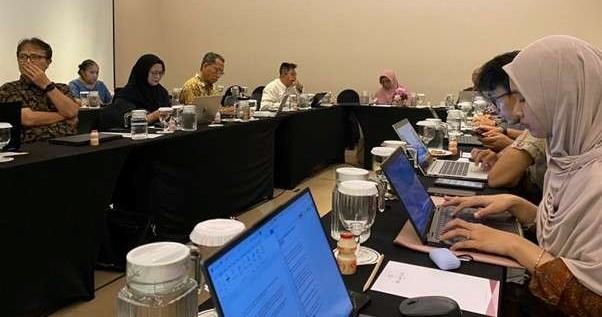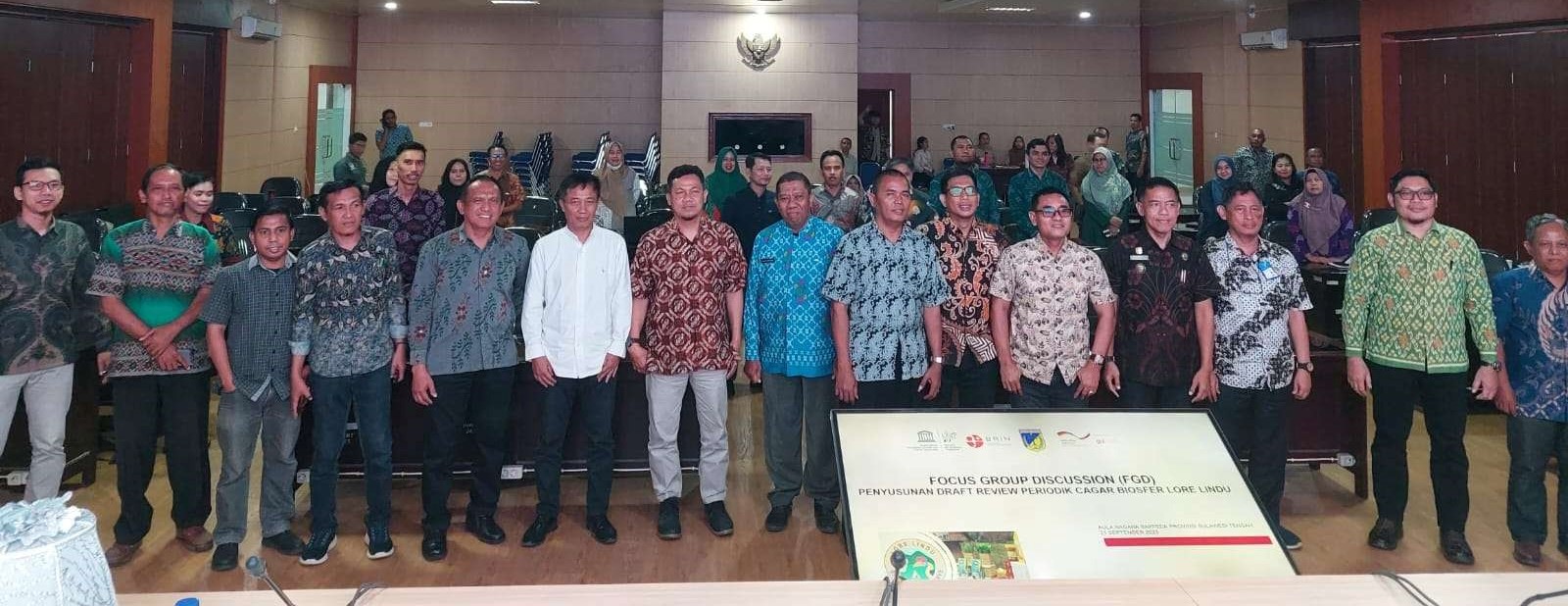FORCLIME
Forests and Climate Change ProgrammeTechnical Cooperation (TC Module)

Select your language

In order to address the climate funding proposal put forward by the Global Climate Fund (GCF), the West Kalimantan Provincial Government has been carrying out a number of consultations and coordinating with relevant stakeholders at the national, provincial, district and field levels in order to provide information and share knowledge and ideas regarding the overall design of the GCF project. The proposal encompasses several supporting documents, specifically: Environmental and Social Safeguard (ESS); Climate Resilience and Vulnerability Assessment (CRVA); Indigenous People Plan (IPP); Gender Assessment (GA) and Gender Action Plan (GAP). The IPP document was prepared through consultations with several stakeholders, including direct consultations that were undertaken at the site level, as well as consultations with community representative respondents across five districts, namely Kapuas Hulu, Sintang, Ketapang, Sanggau and Kubu Raya.
In order to bring the programme that has been designed in the wake of consultations with stakeholders into proper alignment, the West Kalimantan Provincial Environment and Forestry Service held an FGD to discuss the IPP document that has been prepared by Mr. Salfius Seko, SH., MH., the consultant in question, in Pontianak, West Kalimantan on 6 October 2023. The FGD was attended by various parties representing the government, specifically the Environment and Forestry Service; Bappeda; Technical Implementing Units of the Ministry of Environment and Forestry; Community representatives from four villages: Teluk Bakung, Kali Bandung, Majel and Subah; Various indigenous community activists, including AMAN, BRWA, the Banua Talino LBBT Defense Institute, the Dayakology Institute, WALHI and Elpagar; as well as the REDD+ Working Group.
During his opening remarks, the Head of the Environment and Forestry Service for West Kalimantan Province, Mr. Ir. H. Adiyani, MH., explained that the purpose of the meeting was to improve the IPP document as a complementary document to the climate funding proposal from the GCF.
During the meeting, various representatives from the community and traditional community institutions expressed their appreciation for the implementation of the FGD, which has involved input from stakeholders from the very beginning of planning preparations.
For more information, please contact:
Jumtani, Advisor for Sustainable Forest Management and Value Chains, GCF Focal Point
Wandojo Siswanto, Strategic Area Manager for Forest Policy and Climate Change

FORCLIME has supported Bappenas since 2022 in the carrying out of studies aimed at optimizing the bioeconomic use of forests within Indonesia. The initial concept for forest bioeconomic development is set out under the draft National Long Term Development Plan (RPJPN) 2025 - 2045. However, in an effort to further sharpen this concept into a five-year planning document or National Medium Term Development Plan (RPJMN), Bappenas plans to draw up a road map for forest bioeconomic development within Indonesia. For this reason, a series of discussions were recently held with parties directly involved in the potential development of the forest bioeconomy industry, including the Ministry of Environment and Forestry (KLHK) and the Indonesian Chamber of Commerce (Kadin).
The study on forest bioeconomy was conducted by a team of consultants, the results of which were then presented by Mr. Tatang H Soerawidjaja, a representative of the Forest Bioeconomy study consultant team during a meeting that was chaired by the Director of Forestry and Water Resources Conservation (KKSDA) at the Ministry of National Development Planning/Bappenas, Dr. Nur Hygiawati Rahayu, in Depok, West Java on 6 - 7 October 2023. The purpose of this meeting was to: (i) Conduct a final review of the study that has been prepared; (ii) Obtain policy input regarding the potential, opportunities, challenges and direction of forest bioeconomic development within Indonesia from related parties; (iii) Formulate a strategy for the development of a National Policy and Mainstreaming Forest Bioeconomy in Indonesia. The meeting was attended by representatives from the Ministry of Environment and Forestry (Planning Bureau, the Directorate-General of Forest Utilization Business Control, the Directorate-General of Sustainable Forest Management, the Directorate of Forest Product Processing and Marketing Development and the Directorate of Forest Resource Inventory and Monitoring), as well as representatives from the Ministry of Energy and Mineral Resources (the Directorate-General of New Renewable Energy and Energy Conservation) and the Ministry of Investment/BKPM. In addition to the consultants' team and FORCLIME, representatives from the private sector were also present, specifically the Indonesian Forest Concession Holders Association and Kadin.
Bioeconomy involves the use of resources (bioresources) which are not limited to food and feed, but also include energy sources and industrial raw materials. Benchmarks for forest bioeconomic development include the following: 1) Utilization of vegetable resources must be efficient and must meet the pyramid of needs; 2) Recognition of the potential of trees to produce non-food oils as a potential substitute for the role of petroleum as biohydrocarbons and biodiesel; 3) This potential can be processed in biorefineries; 4) Forest sources must be fortified with buffer zones for conservation purposes.
The target for forest bioeconomic utilization is the expansion of wood production into various products, including biorefineries for vegetable-based chemical products and biomaterials. Non-wood-producing tree-based vegetable refineries are also being targeted, for example for latex, essential oils and other substances that can be extracted and further utilized.
The topic of bioeconomics has been incorporated into the 2025 - 2045 RPJPN under the economic transformation section. This economic transformation encompasses eight Development Agendas and 17 Development Programmes with the overall aim of achieving a Golden Indonesia 2045. It is hoped that the results of this bioeconomic study can be used as input during the preparation of Bappenas planning documents (RPJPN 2025 - 2045 and RPJMN 2025 - 2029).
For more information, please contact:
Pipin Permadi, Senior Adviser for Forest Policy
Tazkiyah Syakira, Junior Adviser for Monitoring, Evaluation and Reporting

The Lore Lindu Biosphere Reserve was launched by the Man and the Biosphere - United Nations Educational, Scientific and Cultural Organization (MAB-UNESCO) Programme in 1977 across four districts (Poso, Sigi, Donggala, Parigi Moutong) and Palu City in Central Sulawesi and covers a total area of around 1.67 million hectares. To ensure that this biosphere reserve continues to function in accordance with its determination, MAB-UNESCO organizes a Periodic Review of the reserve every 10 years, and a review of the Lore Lindu Biosphere Reserve (LLBR) is scheduled for 2023.
FORCLIME has been supporting the Coordination and Communication Forum of Lore Lindu Biosphere Reserve during preparations for the Periodic Review since 2022. These preparations got underway with the collection of data and synchronization of programme activities, which were subsequently followed up by a meeting that aimed to build commitment in relation to sustainable development.
This series of meetings was organized to ensure that the LLBR Periodic Review document fulfilled its main objectives regarding areas that are aiming to balance, synergize and harmonize the interests of biodiversity conservation with the interests of sustainable economic development. The meetings are also supporting developments in science, technology, innovation, education, research, monitoring and increased human-resource capacity. With these goals in mind, an FGD was held on 21 September 2023 in Palu City in order to prepare a Draft Periodic Review of the Lore Lindu Biosphere Reserve. The event was opened by the Chairman of the Coordination and Communication Forum of the Lore Lindu Biosphere Reserve, who was being represented by Dr. Moh Saleh NL.
The meeting addressed the various activities that have been carried out by the relevant agencies and related parties within the Lore Lindu Biosphere Reserve area and whether said activities have ultimately had a positive impact on the overall sustainability of the Lore Lindu Biosphere Reserve. In addition, the meeting also addressed whether these activities have been able to provide a better picture of the management achievements of the Lore Lindu Biosphere Reserve within the context of Central Sulawesi’s natural resources and society.
The results of the FGD will be compiled into a draft Periodic Review document that will be presented to the relevant stakeholders during a workshop. This workshop will solicit inputs aimed at the improvement of the Periodic Review document for the Lore Lindu Biosphere Reserve, prior to the submission of the document to MAB-UNESCO.
For more information, please contact:
Arif Hidayat, Junior Forestry and Biodiversity Advisor
Ismet Khaeruddin, Senior Adviser for Biodiversity Focal Point for the KFW Forest Program 3 and Provincial Coordinator for Central Sulawesi
 |
Supported By: |
  |